By Ingrid Newkirk
Cats expect to be treated like royalty. It’s no wonder the Ancient Egyptians thought they were gods. Your home is their palace, but once they step outside it, all manner of deadly dangers await them. That’s why, if you love your cat, it’s vital to ditch the cat flap and keep them safe indoors.
Every single day, around 630 cats are run over in the UK. That’s almost a quarter of a million every year. These ghastly statistics alone are reason enough to keep your feline companion safe at home. In the UK, drivers are not even legally required to stop if they run over a cat.
Fortunately, cats love parading around their palaces, and despite their regal attitudes, they are actually cheap dates. A carrier bag with the handles cut off or simply a box will provide plenty of fun, as will scrunched up balls of paper or tin foil. If they could go shopping, they’d choose a charity shop over Harrods any day! But the most important gift is your love and affection, although they can be subtle in showing they crave it.
There’s always time for a cuddle, a chin rub, or a game with the three cats living at the PETA US HQ, who were rescued from Louisiana after the BP oil spill in 2010. Abandoned by their owners who had lost their jobs and moved elsewhere, they were among 60 cats collected by our emergency rescue team. All except for these three found homes. Marshall has three-and-a-half legs, his partner Brandi had gone almost bald from stress, and their daughter, Bubbles, was afraid of a falling leaf. Now they’re loved, happy, content, and safe inside our offices.
As a law-enforcement officer specialising in cruelty cases, I witnessed the horrors that can befall cats left outdoors. Since forming the first PETA entity years ago, I’ve seen even more. One of the most haunting pictures etched into my memory is of Double Trouble, a cat who endured invasive brain experiments in a laboratory. People known as “bunchers” snatch cats off the streets to sell to labs – it happens all the time. PETA entities have stopped some atrocious experiments, but tens of thousands of cats are still suffering in the EU, the UK, the US, and elsewhere, and until we stop these crude and cruel tests for good, bunchers will continue to steal and sell them.
But keeping your cat safe and happy at home means ensuring they have plenty of special places. As professional bird watchers, they love sitting on windowsills watching the world – and wildlife – go by. It’s like TV for cats, although I also recommend cat TV, especially squirrel videos. If you don’t have a wide enough sill, add a plank and secure a soft rug to it. And unless you’re happy for the sofa to be a do-it-yourself nail bar, be sure to provide a scratching post or a log.
As befits their royal status, cats keep themselves perfectly groomed, clean, and presentable at all times, putting humans to shame – they certainly wouldn’t be impressed by Ashton Kutcher revealing that he rarely showers. This means that the litter box must be scrupulously cleaned twice a day and disinfected once a week. Ask yourself: would you be happy to set your bare foot in it?
Cats allowed to free-roam outside get into deadly scrapes. They are chased up trees by dogs, and without that squirrel-like ability to rotate their ankles, they get hopelessly stuck. They chase rats down drains and sewers and can’t find their way back or are swept away and pick up parasites. Some are poisoned by lapping spilled anti-freeze. And, yes, there are nasty people who want to torture them.
Ditching the cat flap will also prevent 100 million – yes, that’s right – other small animals in the UK from suffering. That’s how many songbirds, mice, voles, and other wildlife species are caught by the UK’s 8 million roaming cats every year. Worldwide, 12.3 billion mammals and 2.4 billion birds are known to be killed annually by cats. Of course it takes patience, but if you pop them in a harness, you can take them for walks. Or, if you’ve a garden, may I suggest buying or building (using old bookshelves and chicken wire) a “catio”, a fenced-off area from which they can admire the view and enjoy the air.
Growing oats and cat-friendly grasses indoors can help keep them healthy. Moreover, there are heaps of tips on understanding your cat’s behaviour – such as shaping their tail like a question mark and squinting their eyes – plus recipes for delicious cat foods in my latest book, 250 Vital Things Your Cat Wants You to Know, based on decades of experience as a cat auntie. As for any signs of illness, such as mess outside the litter tray or a new sensitivity to touch, “better the vet than regret” is a valuable motto.
Making your cat happier makes you happier, too, so always give them the royal treatment and protect them by keeping them loved, entertained, and secure inside your – or rather, their – palace.

Ingrid Newkirk is founder of People for the Ethical Treatment of Animals (PETA) UK

